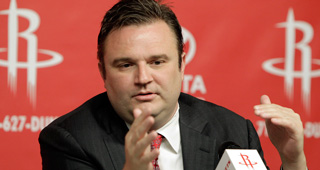The NBA's new collective bargaining agreement has changed the structure and incentives of player movement in ways that we have not even experienced yet. With pieces like the repeater tax and sign and trade restrictions just coming into place, teams and fans alike will learn how much harder it will be for teams to build and keep truly elite teams.
In the sea of organizations dealing with these rules and fitting them in with their financial and personnel constraints, one team stands out as being the most interestingly situated heading forward: the Houston Rockets. Over the past few years, GM Daryl Morey utilized trades, free agency and the draft to put together a young group that can play on the court already and improve over time with both the addition of new talent and being on the correct side of the aging curve.
Here are a few ways the Rockets stand out
1. They have no bad contracts
The way that I analyze deals that are already on the books is by imagining that the player in question was an Unrestricted Free Agent and signed their remaining deal as a new contract. With a bevy of players on their first NBA contracts, the closest Houston has to a “bad” deal would be Jeremy Lin’s two years and $16.7 million and that is a reasonable contract for him.
2. When a team has no bad contracts, every player is a trade asset
In many circumstances, NBA teams are very close to getting the flexibility they want so they give up a piece like a draft pick as a sweetener to get there. This summer, we could see Dallas use their first round pick to facilitate removing Shawn Marion’s contract from their ledgers to clear more cap to go after high level free agents. In Houston’s case, their combination of non-guaranteed contracts and good contracts means that clearing salary should not cost them picks or future outlays of salary. We have already seen part of this with Marc Stein’s reporting that the team has been offered a first round pick in this year’s draft for Thomas Robinson. If Dwight Howard wants to go to the Rockets and the Lakers try to play hardball, Morey should be able to move players like Terrence Jones or Royce White to clear the space rather than hand them over to a conference rival. That truth also could lead to the Lakers posturing less aggressively since something would be meaningfully better than nothing and Houston can create the space to sign him outright.
3. Despite having a young team, the Rockets’ core will not get more expensive very quickly
When analyzing a team’s cap situation, one of the key factors is whether the team will get more or less expensive over time. Older franchises like the Celtics and Heat will become cheaper as older players retire or sign cheaper contracts than they are currently on, similar to what the veterans on the Spurs have done in recent years. Teams with players who are severely underpaid by the rookie wage scale can quickly become more expensive, which ended up being a key reason why the Oklahoma City Thunder traded James Harden last summer.
Despite being the youngest team in the playoffs, Houston’s current squad has a good amount of salary stability over the next few seasons. James Harden will get his big raise this year and the team will still have plenty of room. Both Jeremy Lin and Omer Asik seem pretty close to their annual salary on their next contracts and other than Chandler Parsons, the young players on roster appear pretty replaceable with other young players or cheap veterans once the team gets good enough to draw their interest.
Combining that reality with ownership willing to go into the luxury tax means that Houston’s front office does not need to be afraid of their financial future. Spending money this summer or next on high-level talent does not come at the expense of losing a young player when they become eligible for free agency and may not even put them into the repeater tax if the contracts fit together properly.
4. Houston can spend the money they have now in any of the next few summers
Thanks to the structure discussed above, the Rockets can choose to spend their cap space this summer, in 2014’s strong class, or even in 2015 when both Lin and Asik will be unrestricted free agents with Bird rights. That flexibility can become a double-edged sword here though because while the urgency of now can lead to some strange decisions (like Billy King and the Nets choosing a core of Deron Williams, Brook Lopez, Joe Johnson and Gerald Wallace), being passive and waiting for another year on the idea that something better will come along could allow a good opportunity to pass by.
The other interesting component of Houston’s flexibility is that choosing to push their big spending back would provide cap space to use without the desire to add long-term money. When teams like the Mavericks are offering lottery picks to take on expiring contracts, savvy GM’s with space can extract quality cost-controlled resources to make their team even deeper down the line. The only problem with that in July 2013 is that some teams will be reticent to trade their firsts in a hyped 2014 NBA Draft but proper protection could work out for both sides.
What it all means
The Rockets have the space and structure to add one more big salary either through a trade or free agency. With relatively few people worth that money each summer, management can easily change gears if those players elect to go elsewhere and procure some talent and resources to keep the team relevant in the interim. As a playoff team in the Western Conference with an extremely young core, Houston does not have the same urgency as some other franchises and can exploit their desire to make a big splash and get more cheap talent.
The biggest challenge with having their strong foundation has to be the pressure that comes with the next big move since it likely will crystallize the team for the next 3-4 seasons and determine whether they can legitimately contend for championships in a league that could see some major movement in the near future. I fully expect them to be right in the middle of the Dwight Sweepstakes and make a very interesting pitch to LeBron James, Luol Deng and Pau Gasol in 2014 if they miss out this summer, swooping up assets along the way. They could also put some pressure on rival teams through the Restricted Free Agency process in whatever seasons they have space.
While it could end up being much ado about nothing, Houston has the rare opportunity to add a star piece to an already strong team. Considering their ownership, management and talent, they should be able to make the most of it…eventually.



